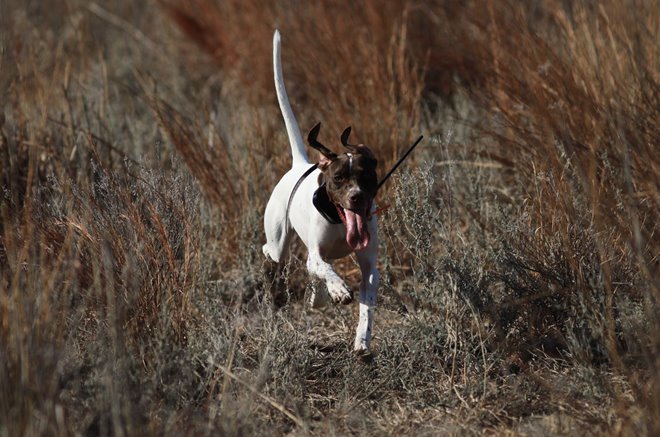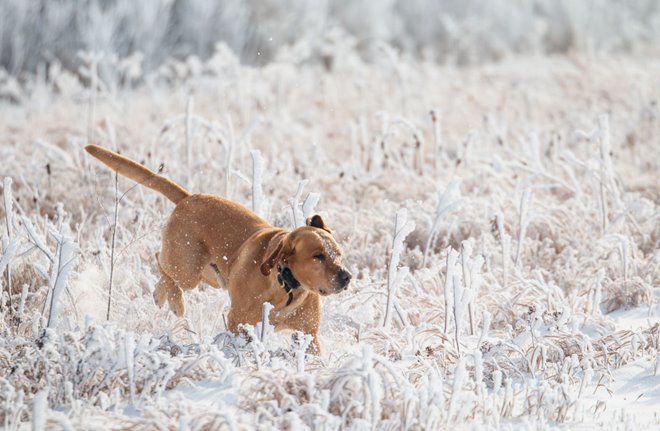
How hunting conditions might inform how and what you feed and how you water your bird dog
By Tom Carpenter
Rain or shine, at home or on the road, training hard or hunting with drive, our bird dogs need to eat. But when conditions trend to temperature extremes, what considerations do we need to make for our canine companions? We caught up with Dr. Brian Zanghi, a dedicated bird dogger (black Lab) and hunter who happens to double as senior research nutritionist for Nestle Purina at their research Center in St. Louis, Missouri.
Feeding Considerations: Hot
“During the summer months, a dog’s caloric needs typically decrease because of less training and exercise, as well as shorter exercise durations required because of warmer temperatures,” says Zanghi. “Keep your hunting dog on the same performance food all year long, but simply reduce the portion in the summer months to meet the lower daily calorie needs.”
Special attention to extra hydration is essential during the warmer months, which can be supported by adding water to the dog’s food bowl.
Warm Weather Feeding Tips
For the warm weather hunt, Zanghi says staying hydrated is the most important consideration, with frequent and small drinks to offset the persistent water loss through panting.
 1.
1. The best frequency for water is between 15 to 20 minutes to give the dog a rest and help to rehydrate. “Prolonged hunting for over an hour without a drink or rest can risk the dog becoming dehydrated,” says Zanghi.
2. Do a skin pinch in the field during periods of rest. “A recent research study we published revealed that an easy way to assess relative hydration in the field is through a brief and gentle skin pinch on the top of the dog’s head to see if the skin ‘tents,’” says Zanghi. “If the skin stays ‘tented’, then the dog is becoming mildly dehydrated and should be provided a bit of additional rest and water.”
3. Watch the tongue. “Early signs of overheating are when the panting dog’s tongue is curled up to appear appearance, as opposed to hanging limp,” says Zanghi.
Feeding Considerations: Cold
“During the coldest months, the combination of extra hours hunting and your dog’s body burning more energy simply trying to stay warm during a cold hunt, all contributes to a greater food portion size to provide more calories,” says Zanghi. “Doing this gradually over the season as the dog’s endurance improves and calorie needs increase is the best way to approach this.
Weekly or bi-weekly adjustments of ¼ to ½ cup changes will likely suffice, Zanghi says.

Cold Weather Feeding Tips
1. “Timing the meal should always be after the hunt is done for the da, to allow for maximum digestion and absorption,” says Zanghi. “But if it is a full day hunt, small portions of wet food or handful of kibble can be helpful for some dogs during a prolonged lunch break, along with rehydrating.”
2. “Adding water to food is ideal to help the dog be as hydrated as possible the day before the hunt as well as water before, during and immediately after the hunt,” says Zanghi. “Even though it is cold, dry cold air can also accelerate dehydration when the dog is working hard.”
3. “Mobility supplements to support hard working joints can be helpful as the season progresses,” Zanghi says, “as well as supplements enriched with antioxidants to support the needs of exercising muscles, exercise metabolism and recovery.”
Dealing with Dehydration
Dehydration is a concern in all conditions – warm, cool or in between – when we are working our bird dogs. Here are some of the symptoms of dehydration to look for:
*Dry, sticky gums
*Excessive panting
*Sunken or dry looking eyes
*Skin that doesn’t snap back into shape quickly when lightly pinched
*Lethargy
*Loss of appetite
*Depression
“Use some flavor enhancement (like low-sodium chicken broth) if you feel like he’s not drinking enough water,” says Zanghi. “If he’s simply thirsty, he’ll drink on his own and recover. However, if you suspect more severe dehydration, especially if your dog has been vomiting and/or having diarrhea, call a veterinarian immediately.”
Tom Carpenter, assisted by Lark, is editor at Pheasants Forever.
Photo credits: Logan Hinners (Lab). Chad Love pointer).